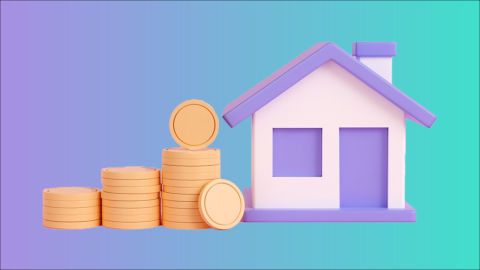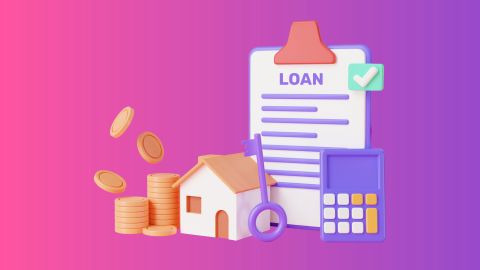Your credit score plays a crucial role in determining your eligibility for a home loan, as it is one of the primary factors that lenders consider when deciding whether or not to approve your application. A CIBIL Score is a 3-digit number ranging from 300 to 900 that reflects your creditworthiness and loan repayment behaviour. Generally, a score of 750 and above is considered good and increases your chances of getting a home loan approval.
Lenders use your CIBIL Score to assess your credit risk and decide whether to approve your loan application. A higher CIBIL Score indicates that you are a low-risk borrower and are likely to repay the loan amount on time. A lower score implies that you are a high-risk borrower and may not be able to repay the loan amount.
Credit score range and what it means?
Whether from CIBIL or another issuing body, most credit scores range between 300 and 900. A score of 900 is the highest score achievable. Having a score of 750 and above implies that you have an ideal credit score for a home loan. It lets you get a loan easily and gives you negotiating power. This means you can access a competitive home loan interest rate and even get ample housing finance.
Minimum CIBIL Score for home loan
Lenders usually consider 725 as the minimum CIBIL Score required for a home loan. However, a score ranging between 725 and 749 is considered good, and lenders may offer you a home loan after inquiring into your other financial details. Scores ranging between 550 and 649 are average and need working on. Bad scores are the ones that fall in the 300 to 549 bracket. Finally, NH or NA implies that you do not yet have any credit history.
In case your CIBIL Score is lower than 750, you can still improve your chances of getting a home loan approval by increasing your income, reducing your current liabilities, opting for a longer tenure and increasing your down payment.
It is important to note that lenders also consider other factors such as your income, age, employment status, current liabilities, and down payment while assessing your home loan application. So, even if your CIBIL Score is low, you can still get a home loan approval if you have a strong credit history and other factors in your favour.
If you are planning to purchase your dream home and want to understand how much financing you can access, taking the first step is simple. Check your home loan eligibility with Bajaj Finserv to explore competitive interest rates starting at 7.15%* p.a. and loan amounts up to Rs. 15 Crore*. You may already be eligible, find out by entering your mobile number and OTP.
What is a CIBIL Score?
CIBIL Score is essentially a credit score offered by the Credit Bureau TransUnion CIBIL. Along with Equifax, Experian, and High Mark, CIBIL, or Credit Information Bureau (India) Limited is one of the 4 credit bureaus authorised by the RBI to keep a credit record of every Indian citizen. In India, the CIBIL Score carries immense weightage as most of the financial institutions here have ties with the bureau. As such, your lender is likely to give preference to a CIBIL Score over other valid credit scores.
How to check credit score offered by CIBIL?
You can check your CIBIL Score online via CIBIL’s official website, once a year for free, or multiple times a year at a fee. Follow these steps:
- Visit the website
- Click ‘Get your CIBIL Score’, placed at the top-right corner
- Select a subscription plan
- Enter details like your date of birth, mobile number, and email address
- Create a password that you will use when logging in later
- Select your ID type and enter your ID details
- Proceed to ‘verify your identity’ and answer all questions accurately
- Complete the process at the ‘make payment’ tab
- If you need just 1 CIBIL Score per year, skip the subscription plans and proceed to your account
- Login by authenticating yourself via email or OTP
- Enter details in the form that appears
- Upon submission, your CIBIL Score will be displayed on the dashboard
Now that you know your CIBIL Score, you can take the next step towards homeownership with confidence. A good credit score opens doors to attractive home loan offers with flexible repayment options. Check your eligibility for a home loan from Bajaj Finserv and discover loan options with tenures up to 32 years and hassle-free approval in 48 hours*. You may already be eligible, find out by entering your mobile number and OTP.
How much CIBIL Score is required for a home loan?
The best CIBIL Score for a home loan is 750 and more. That said, a score of 700 and above is still good and should suffice for most lenders. However, the actual figure is lender-specific. A higher CIBIL Score translates to swifter loan approval, on more affordable terms. So, it is always desirable to have a higher CIBIL Score in terms of the upper limit.
Additional read: How to improve credit score for home loan?
What is the minimum CIBIL Score to get a loan?
The minimum CIBIL Score for a home loan in India varies across lenders. For one, the cut-off may be 700 and for another 650. Since scores ranging between 650 and 749 are classified as ‘good’ and scores of 750 and above as ‘excellent’, you better your chances by having a higher CIBIL Score.
Does Bajaj Finserv check your CIBIL Score for home loan and balance transfer?
Yes. Like other lenders, Bajaj Finserv also checks your CIBIL Score before giving the green signal on a home loan or a home loan balance transfer application. The Bajaj Finserv Home Loan offers you high-value financing, up to Rs. 15 Crore*, at lowest interest rates. You can repay your loan via a tenure of up to 32 years* and make prepayments and foreclose your loan at no additional charge. Since it is an economical solution, you may want to transfer your existing home loan to Bajaj Finserv. You can do so quickly and with minimal documentation.
As a general rule, the minimum score for a home loan is 750. The minimum score for a balance transfer can be slightly lower and depends on internal policies and other factors.
Does my CIBIL Score affect my home loan eligibility?
Yes. If you have a good CIBIL Score for a home loan, eligibility terms become simpler, and your application gets approved quickly. Lower scores imply risk, and lenders may have to tweak the loan offering accordingly. For example, a loan offered for a credit score of around 600 may mean that you have to settle for a lower principal amount, say up to only 40% of your asset’s value. Similarly, it may be very difficult to get a home loan without a credit score, and lenders will have to look into other personal finance factors in detail before approving such an application.
Can I get a home loan with a low CIBIL Score?
While it is possible to get a loan sanctioned with a low CIBIL Score, you should be prepared for a tussle. Lenders bank on your CIBIL Score as it reflects your repayment capacity and a lower score only presents you as a higher risk. Consider having a back-up funding option when you approach a lender with your required loan ask, given that they may not be able to sanction your desired amount – based entirely on your credit score. The best work around this is to commit to boosting your credit score, with better financial habits.
Can a CIBIL defaulter get a home loan?
The term CIBIL defaulter is a misnomer, and the question can be better understood as: ‘Can a person who has defaulted on loans or EMIs and thereby has a low CIBIL Score get a home loan?’ The answer is yes, but with difficulty. Since defaults indicate a lapse in your faithfulness to debt repayment, it can be tough to get a home loan. However, there are some measures that you can take. For instance, you can improve your score by paying all present EMIs diligently, boosting your income, and consider including a guarantor or apply for a joint home loan with someone who has a high credit score.
Read also: How does a joint loan affect the credit score?
Benefits of a good CIBIL Score
Here are a few standout benefits of having a good CIBIL Score:
- Get more negotiating power
- Obtain nominal home loan interest rate
- Avail a higher home loan sanction
- Benefit from speedy loan processing
Ways to increase credit score quickly
While a CIBIL Score proves your financial mettle, being able to service a loan hinges on another parameter as well, such as your debt-to-income ratio. To get a home loan that matches both your CIBIL Score and your debt-to-income ratio, use a Home Loan Eligibility Calculator or simply before applying. Alternatively, check your eligibility for a home loan from Bajaj Finserv using your mobile number and OTP, and avail home financing on personalised terms. Single-step verification here gives you instant approval through a customised home loan deal.
Additional read: How credit score can determine your home loan EMIs?
Helpful links for understanding home loan process
Apply for a home loan in different cities
Home loan options for different budgets
Home loan calculators
DISCLAIMER:
While care is taken to update the information, products, and services included in or available on our website and related platforms/websites, there may be inadvertent inaccuracies or typographical errors or delays in updating the information. The material contained in this site, and on associated web pages, is for reference and general information purpose and the details mentioned in the respective product/service document shall prevail in case of any inconsistency. Subscribers and users should seek professional advice before acting on the basis of the information contained herein. Please take an informed decision with respect to any product or service after going through the relevant product/service document and applicable terms and conditions. In case any inconsistencies observed, please click on reach us.
*Terms and conditions apply








